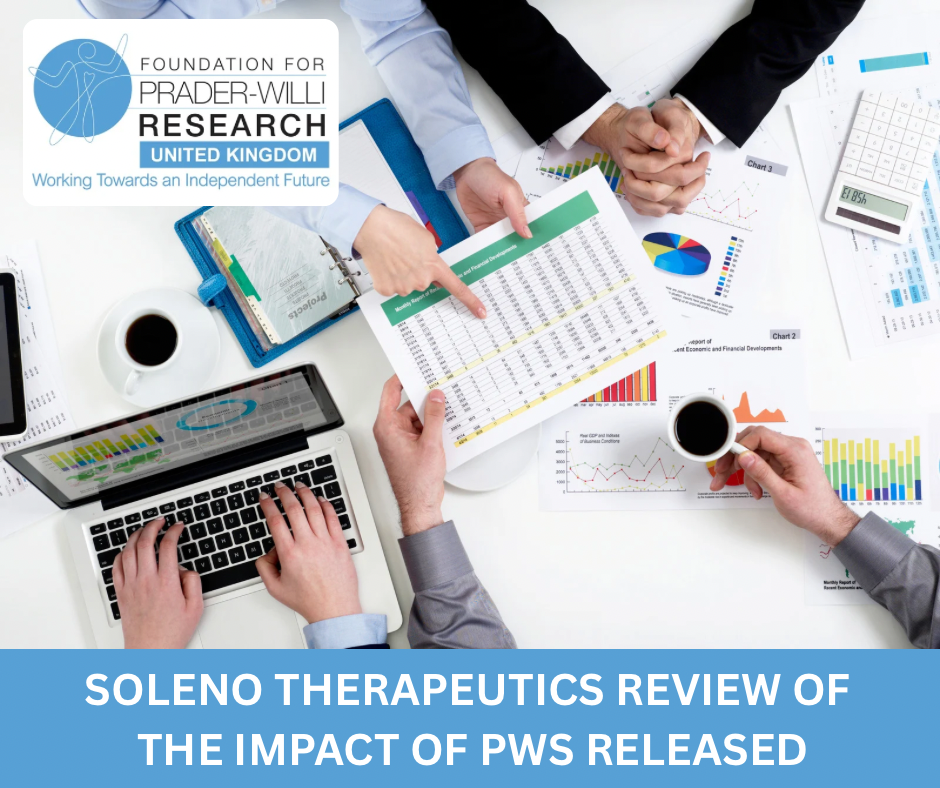
If you’re parenting a child with Prader-Willi Syndrome (PWS), you already know how complex and challenging the journey can be. A new study published in Orphanet Journal of Rare Diseases (2025) has pulled together years of research to give us a clearer picture of what families face—and what needs to change.
Soleno Therapeutics, the company behind the development of the hyperphagia drug VYKAT XR/DCCR, are behind the publication and they have gathered key research and literature to create this study – powerfully showing the impact of PWS on individuals and families.
The whole article is available to download for free at https://link.springer.com/content/pdf/10.1186/s13023-025-03787-0.pdf and we have outlined some of the key issues it addresses below:
1. Life Expectancy and Health Risks
The review confirms something many of us worry about: people with PWS tend to have shorter lifespans. The most common causes of death include:
· Breathing problems
· Heart issues
· Complications from overeating
This highlights how critical it is to manage health risks early and consistently.
2. Hyperphagia: More Than Just Hunger
Hyperphagia—the constant, intense drive to eat—is one of the most difficult symptoms of PWS. It’s not just about being hungry; it’s a relentless urge that can lead to dangerous situations if not carefully managed. Families often have to lock food away, monitor meals closely, and stay vigilant 24/7. It’s exhausting, and it affects every part of daily life.
3. The Emotional Toll on Families
The study also looked at how PWS affects parents, siblings, and caregivers. The emotional strain is real:
· Parents often feel overwhelmed and isolated.
· Siblings may feel left out or stressed.
· Relationships can suffer under the weight of constant care.
This shows that PWS isn’t just a medical condition for the person affected—it’s a whole family condition.
4. Financial and Healthcare Burden
Caring for someone with PWS often means:
· Frequent doctor visits
· Specialised therapies
· Ongoing medical support
All of this adds up. Families face higher healthcare costs and often need to fight for the support they deserve.
This is where the research becomes especially important: medical organisations and health systems will need to weigh the cost of new treatments like VYKAT XR against the long-term cost of managing the disease without them.
5. Quality of Life: A Missing Piece
Surprisingly, there’s still not enough research on how PWS affects overall quality of life. But what we do know is that many individuals with PWS struggle with:
· Physical health
· Behavioural challenges
· Social isolation
We need more studies—and more solutions—that focus on helping people with PWS live fuller, happier lives.
So What’s Next?
This review sends a clear message: we need better treatments, more support, and greater awareness.
It also means reminding ourselves that we’re not alone. There’s a growing community of researchers, doctors, and fellow parents working toward a better future for our children.
In addition to this review of existing literature, Soleno are also working on their Burden of Illness Study, which aims to capture the real-world impact of PWS on families and healthcare. You can learn more about it in the video below and also from Soleno during the February PWS Stronger Together Webinar at https://www.pwsstrongertogether.co.uk/Webinars
By highlighting the broader impact of PWS—not just the symptoms but the emotional, financial, and social dimensions—this research marks an important step forward. The work being done by Soleno is extremely valuable in highlighting the need for more research, more treatments and big changes in order to improve the quality of life of everyone touched by Prader- Willi Syndrome.